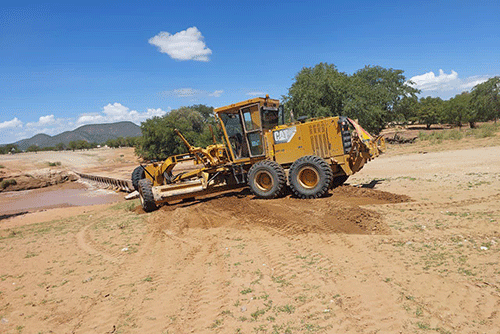OTUANI – The Kunene Regional Council said it has encountered serious communications challenges with its regional stakeholders, with the main reason being that most capital projects implemented by line ministries are coordinated from their respective head offices in Windhoek.
As a result, the Kunene Regional Council (KRC) is set to return just over N$1.3 million to Treasury due mainly to lengthy procurement processes and late budget approvals, while the region as a whole is expected to return N$56 million to the fiscus.
Director for planning in the regional council Immanuel Nafele confirmed to New Era that the region is returning the much-needed funds, but noted that they are only returning N$1.3 million out of N$6.9 million they received during the 2022/2023 financial year.
He stated that the region was allocated a total of N$197 million across 16 sectors in the development budget towards the implementation of capital projects for 2022/2023. Out of N$197 million received in the region, some N$56 million is expected to be returned from all sectors.
The 16 sectors include education, mines and energy, health and social services, labour, industrial relations, justice, urban and rural development; environment, forestry and tourism; works and transport; the National Planning Commission, information and communication technology, agriculture and land reform, and water and home affairs.
“A total amount of N$6.9 was allocated to the Kunene Regional Council towards the implementation of primary projects during the financial year under review. [These include the] construction of services infrastructure in Sesfontein (N$709 000), the construction of the Okanguati settlement area office (N$3 million), services infrastructure in Okanguati (N$1.2 million), construction of services infrastructure in Fransfontein (N$709 000), and the implementation of rural sanitation (N$1.3 million), respectively,” said Nafele.
Out of the N$6.9 million received, a total amount of N$5.6 million was spent on the implementation of the projects during the year under review. This means N$1.3 million was not utilised, and will now be returned to Treasury.
“Although the regional council is mandated to coordinate the development planning of the region, the council experienced a serious challenge in communication with its regional stakeholders,” he emphasised.
However, residents who are disappointed by the lack of development accused political leaders of spending productive time fighting each other in meetings, instead of implementing developmental and capital projects in the region.
The Kunene region’s Budget Execution Report for the 2022/23 financial year points out that it cannot account for the execution of the budget allocated for regional capital projects of line ministries.
The Kunene region remains one of the poorest in the country, and according to its administrative leadership, the money is being returned to Treasury due to various reasons, including some cumbersome provisions in the Procurement Act.
This sad reality was confirmed by the chairperson of the regional council, Sesfontein constituency councillor Hendrik Gaobaeb in a recent interview with this publication.
Although the politician could not specify which regional entity is returning the biggest chunk to the government, he accused parliamentarians of approving the budget late, leaving the regional leadership with little to no time to implement budgeted projects during a financial year. These factors, he said, are forcing the region to return money to Treasury.
“Apart from poor communication with stakeholders, the main problem why we do not utilise the entire budget allocated to the region [is because] the budget is approved very late in September, just leaving us with a few months before we return the money,” he added.
The chairperson of the regional council completely denied this allegation, saying that leaders understood each other. Instead, he pinned the blame on administrative officers for stifling development in the region.
“We work together very well. However, the administrative officers are the problem in the region. There also is no budget allocation equality in the country, knowing that Kunene is a vast region,” charged Gaobaeb in defence of perceived poor leadership.
Meanwhile, Opuwo Rural constituency councillor Western Muharukua also weighed in.
“Councillors are spending much time fighting and resolving chaotic issues caused by a certain political party which bribes traditional authorities with chieftainship and state recognition. Instead of the councillors working to resolve developmental issues, we are left to resolve political issues,” he stressed.
More than 43.3% of Namibia’s population lives in multidimensional poverty, according to a UN report. Kunene, Kavango East, Kavango West, Zambezi, Ohangwena and Omaheke are ranked among the poorest regions in the country.
(Kunene 2)
Caption:



